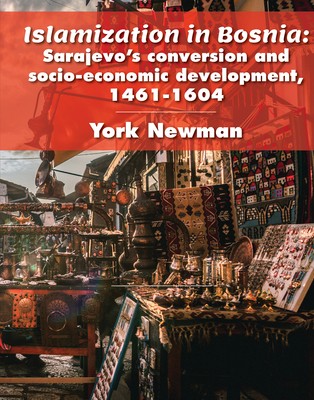
- We will send in 10–14 business days.
- Author: York Norman
- Publisher: Academica Press
- ISBN-10: 1680530429
- ISBN-13: 9781680530421
- Format: 15.2 x 23.1 x 2.3 cm, kieti viršeliai
- Language: English
- SAVE -10% with code: EXTRA
Reviews
Description
The rise of Ottoman Sarajevo in the late fifteenth and sixteenth centuries is emblematic of a unified new Muslim community whose conversion to Islam and booming social and economic growth unified both the city and its hinterland. Primarily based on a wide array of Ottoman administrative sources, this monograph builds on earlier studies of Sarajevo and other Ottoman cities to analyze the critical social and economic factors behind these developments. Numerous references to manumitted slave converts to Islam can be found among Sarajevo's pious foundations. Many of these manumitted slaves held hereditary posts in the pious foundations, thus becoming part of the urban elite. In the countryside, Muslims dominated rural elites from the initial Ottoman conquest onwards. The peasants and petty nobility converted much more gradually. Their steady conversion can be partially tied to the practice of disproportionately distributing privately-held arable land to Muslims and Muslim converts. These new converts became critical participants in the city's newly emerging economy. The manumitted slaves who staffed the pious foundations often distributed cash credit at interest to the merchantry and urban notables, helping fuel further economic development. Arable land holders often used their privileges to sell their lands to the highest bidder. The state, which often sanctioned such purchases, helped promote higher grain production and the expansion of urban elites into the countryside.
EXTRA 10 % discount with code: EXTRA
The promotion ends in 21d.23:47:51
The discount code is valid when purchasing from 10 €. Discounts do not stack.
- Author: York Norman
- Publisher: Academica Press
- ISBN-10: 1680530429
- ISBN-13: 9781680530421
- Format: 15.2 x 23.1 x 2.3 cm, kieti viršeliai
- Language: English English
The rise of Ottoman Sarajevo in the late fifteenth and sixteenth centuries is emblematic of a unified new Muslim community whose conversion to Islam and booming social and economic growth unified both the city and its hinterland. Primarily based on a wide array of Ottoman administrative sources, this monograph builds on earlier studies of Sarajevo and other Ottoman cities to analyze the critical social and economic factors behind these developments. Numerous references to manumitted slave converts to Islam can be found among Sarajevo's pious foundations. Many of these manumitted slaves held hereditary posts in the pious foundations, thus becoming part of the urban elite. In the countryside, Muslims dominated rural elites from the initial Ottoman conquest onwards. The peasants and petty nobility converted much more gradually. Their steady conversion can be partially tied to the practice of disproportionately distributing privately-held arable land to Muslims and Muslim converts. These new converts became critical participants in the city's newly emerging economy. The manumitted slaves who staffed the pious foundations often distributed cash credit at interest to the merchantry and urban notables, helping fuel further economic development. Arable land holders often used their privileges to sell their lands to the highest bidder. The state, which often sanctioned such purchases, helped promote higher grain production and the expansion of urban elites into the countryside.


Reviews